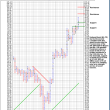by Mawer Global Investment Research
The Fed’s decision to delay tapering its $85 billion (USD) in monthly bond purchases threw most in the investment industry for a loop last week. While we were surprised at the delay, we were certainly not left reeling. Why? Because we put very little stock in making market outlooks. We realize that we are living in a world of complexity and attempting to predict – with certainty – an outlook for a complex system, such as the stock market, is ill-advised. Since top-down predictions are difficult to make with any precision, we spend the majority of our time on understanding something narrower in scope: an individual security.
But don’t just take our word for it. Science also shows us why we shouldn’t put too much stock in outlooks.
Our explanation begins with Pierre-Simon LaPlace, a 19th century French mathematician and astronomer. LaPlace lived shortly after Sir Isaac Newton and, like many people in this time, was greatly influenced by Newton’s theory of the Clockwork Universe. In this universe, the clear relationships between cause and effect led to the notion that we could, with great accuracy, predict the behaviour of the solar system. LaPlace took this idea to the extreme and believed if you had enough inputs, you could predict the future indefinitely. This “intellect” became known as “LaPlace’s Demon” and was a widely accepted view of how things worked in the 19th century.
This is also the world that many in the investment business think we live in today: if we are smart enough and if we analyze things enough, we can figure out what markets are going to do next. If the Fed cuts rates, stocks go up. Works every time – just like the law of gravity.
Unfortunately, lots of people have tried to approach investing this way, and, for the most part, they have failed because we don’t live in the world described by Isaac Newton or Pierre-Simon Laplace. Instead, we live in a world of complexity.
Stock markets are complex systems. Worse, they are “complex adaptive systems,” meaning that the people within them don’t always act the same way under similar sets of circumstances. That’s because we’re human. We change our minds, act emotionally, and adapt to new situations differently each time. This makes stock market predictions even more prone to error than a weather forecast. Not even LaPlace’s Demon can figure it out. The immensely complex inter-relationships of politics, societal, economic and human factors are simply impossible to accurately model.
If making predictions is a questionable investment strategy, what are we supposed to do as investors?
The good news is that just because a system is complex doesn’t mean it’s hopelessly unpredictable. We just have to respect the limits of our knowledge. For example, we don’t know if there will be a hurricane in Cancun on February 10th next year. But we can say that 97% of the time major hurricanes only form in the Gulf of Mexico from June until November. So if you’re planning a Mexican vacation, February is likely okay. This is a generalization, and it may be wrong, but the odds are definitely in your favour.
It is the same with investing. Some things you can predict with a fair degree of accuracy and some things you cannot. The important skill is to know the difference. It doesn’t mean that we don’t care about the direction of the Canadian dollar, the price of oil or whether the economy will be strong or weak over the next 12 months. We do. It’s just that we know it can’t be predicted with any certainty so we don’t spend much time on it. Instead, we focus on what puts the odds in our favour and the range of probabilities around it.
One prediction investors can make with a high degree of confidence is that a portfolio of securities with certain characteristics will generate a return over time that is better than the market, with less risk than the market. So what are these characteristics? For equities, we believe that a portfolio of wealth-creating companies that have a return on capital greater than their cost of capital, led by strong management teams, and bought at a discount to their intrinsic value will beat the market over time. For fixed income, we believe that focusing on investment grade credit will provide investors with the greatest opportunity to add value. This may or may not happen during the next calendar year, but we’re comfortable that it will happen over the long-term.
While these are simple strategies, they are definitely not easy to implement. It is hard work and time consuming. But this approach is time-tested and about the only prediction we can comfortably make. It may be boring, but it works.
Mawer Global Investment Research
Copyright © Mawer Investment Management















